UMass Chancellor Reyes outlines changes amid financial uncertainty under Trump administration
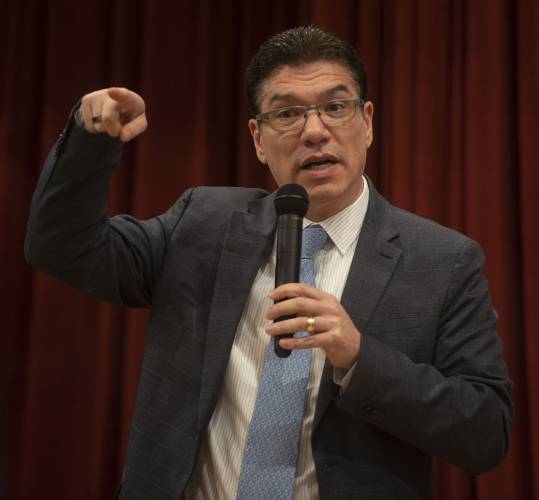
In a letter sent to the campus community, University of Massachusetts Amherst Chancellor Javier Reyes outlines a series of steps the flagship is taking in response to funding cuts and possible changes to the U.S. Department of Education by the Trump administration. gazette file photo
| Published: 03-30-2025 11:40 AM |
AMHERST — More stringent oversight of spending on salaries, capital projects and various non-personnel expenditures at the University of Massachusetts, and both reducing graduate admissions in some departments and notifying some prospective graduate students that they will not be able to study in Amherst, are underway, according to a letter sent to the campus from UMass Chancellor Javier Reyes.
In the March 26 communication to the UMass community, Reyes discusses a series of steps being taken to maintain the university’s role as a center of “open inquiry, academic freedom, unbridled creativity and free expression” in the face of potential loss of federal financial support, and possible changes to the U.S. Department of Education, by President Donald Trump.
“To strengthen our position based on our principles and values, we must be prepared to take on the challenges before us, remain adaptable to the evolving landscape, and position the university to continue fulfilling its foundational promise of expanding educational access, fueling innovation and creativity, and sharing and using our knowledge for the betterment of the world,” Reyes wrote.
While no changes are planned to undergraduate admissions or financial aid, UMass officials are paying attention to how aid is distributed and how the Free Application for Federal Student Aid, or FAFSA, process might be impacted as the result of Trump’s executive orders calling for the eventual shuttering of the Department of Education.
Most of the memo outlines the fiscal planning UMass will be doing, with Reyes writing that these are not budget cuts or a hiring freeze, but are about using care in and limiting discretionary spending, including on travel to conferences and purchases of equipment.
The letter states that all non-personnel expenditures over $50,000 will require approval from whoever heads a department, such as a vice chancellor, athletic director or a dean; that all capital project requests will be evaluated based on health and safety requirements and the preservation of core university facilities; and that any faculty and staff hiring be done only for positions deemed critical to the university’s operations.
For requests for critical hires, approval needs to come from vice chancellor or, in the case of faculty hires, the provost.
“To be clear: This is not a hiring freeze, but rather a strategic approach to hiring in response to the evolving funding landscape,” Reyes wrote.
Article continues after...
Yesterday's Most Read Articles
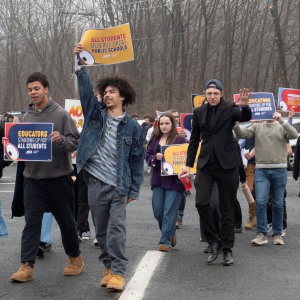 Nearly all of South Hadley High’s student body holds ‘walkout to walk-in’ rally to oppose cuts, call for funding reform
Nearly all of South Hadley High’s student body holds ‘walkout to walk-in’ rally to oppose cuts, call for funding reform
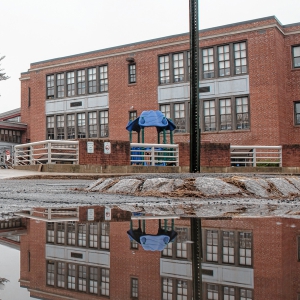 Northampton schools probe staff response to student’s unfulfilled IEP
Northampton schools probe staff response to student’s unfulfilled IEP
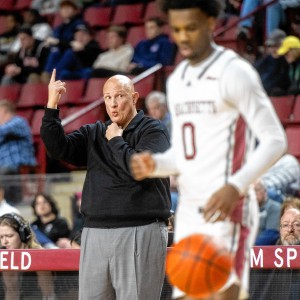 UMass basketball: Minutemen land Florida Tech transfer Donovan Brown
UMass basketball: Minutemen land Florida Tech transfer Donovan Brown
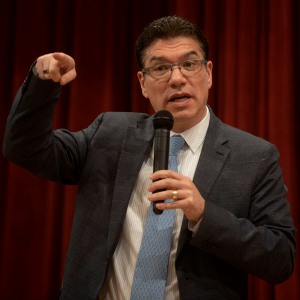 UMass Chancellor Reyes outlines changes amid financial uncertainty under Trump administration
UMass Chancellor Reyes outlines changes amid financial uncertainty under Trump administration
 Northampton Housing Authority boss placed on leave
Northampton Housing Authority boss placed on leave
 Four Red Fire Farm workers arrested as part of ICE operation in Springfield
Four Red Fire Farm workers arrested as part of ICE operation in Springfield
In fields that depend on National Institutes of Health grants, there is concern that some graduate students will not be able to pursue their studies, where federal funding underwrites salaries, graduate stipends and tuition, equipment purchases, health and safety and other aspects.
“With more than $150 million in annual federal funding now potentially uncertain, we have asked our schools and colleges to take action to ensure their graduate admissions plans are financially sustainable,” Reyes wrote.
One impact is that graduate admissions have been reduced in departments with significant NIH funding and, while not implementing across-the-board cuts or closing admissions or programs, some doctoral programs are in the process of informing applicants already offered admission that the funding is either no longer guaranteed or has been rescinded.
“These notifications will be limited to cases where accepted offers exceed the anticipated available funding,” Reyes wrote.
Reyes announced that UMass, through its Student Affairs and Campus Life office and the UMass Amherst Foundation, is also relaunching the Angel Fund, created in 2017 to help meet the needs of individuals who are adversely affected by changes in federal immigration policy.
At the same time, UMass is working with Student Legal Services to explore potential external partnerships that will provide international students with emergency immigration-related legal support.
A federal actions page website at UMass, a clearinghouse for information about what the Trump administration is doing to impact higher education and students, has new guidance for travel for students, provided by Shelly Perdomo-Ahmed, vice chancellor of Student Affairs & Campus Life, and for faculty and researchers, provided by Fouad Abd-El-Khalick, provost and senior vice chancellor for Academic Affairs, and for international students and scholars on UMass-sponsored visas and employees.
Scott Merzbach can be reached at smerzbach@gazettenet.com.






 Dash to the dealership?: Local consumers, car sellers brace for auto tariffs to kick in Wednesday
Dash to the dealership?: Local consumers, car sellers brace for auto tariffs to kick in Wednesday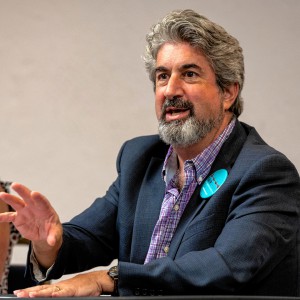 MTA president offers ways for legislators to address ‘unprecedented dangers’ to K-12 education in state
MTA president offers ways for legislators to address ‘unprecedented dangers’ to K-12 education in state ‘Wallace the Brave’ tumbles onto Gazette comics page
‘Wallace the Brave’ tumbles onto Gazette comics page
